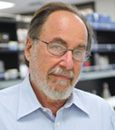
David L. Baltimore
27 April 2010 at 18:00 in the Print Media Academy Kurfürstenanlage 52-60, Heidelberg
Mit freundlicher Unterstützung der Manfred Lautenschläger Stiftung
David Baltimore, California Institute of Technology
Will there ever be a cure for cancer?
Abstract
Cancer is hundreds of diseases with one common symptom, uncontrolled growth of cells. Like fever or itchiness, also common symptoms, many different causes can produce the symptom. For cancer, the causes are mainly mutations of genes. The actual generator of these mutations is rarely known but our ability to diagnose the causal genes has greatly improved in recent years. Errant genes are often poor targets for therapy but our ability to deal with them using drugs is increasing. Whether we will be able to make all the drugs we need to deal with the range of cancers is a challenging question. The best way to deal with cancer might be by activating our immune systems to fight the cancer; this has proved very difficult but progress is being made. A cure for cancer would be hundreds of treatments for the hundreds of diseases; this remains a challenge for the scientific community.
David Baltimore (born 7 March 1938, New York), U.S. virologist. He received his doctorate from the Rockefeller Institute. He and Howard Temin (1934 - 94), working independently, discovered an enzyme that synthesizes DNA from RNA, the reverse of the usual process. This enzyme, reverse transcriptase, has become an invaluable tool in recombinant DNA technology. The research of Baltimore, Temin, and Renato Dulbecco helped illuminate the role of viruses in cancer; the three men shared a Nobel Prize in 1975. In 1990 Baltimore became president of Rockefeller University.
David Baltimore served as president of the California Institute of Technology from 1997 to 2006, when he was elected to a three-year term as president of the American Association for the Advancement of Science. He is currently the Robert A. Millikan Professor of Biology at Caltech.